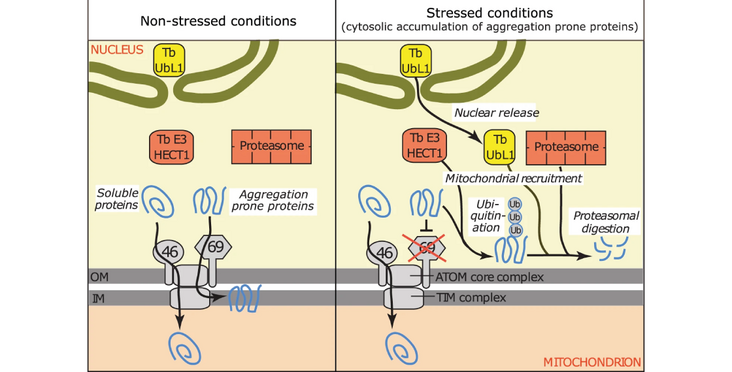The Schneider lab in collaboration with the Warscheid and Ochsenreiter labs, discovered a new quality control mechanism in Trypanosomes. The mechanims can get triggered when the translocase subunit responsible for mitochondrial import of hydrophobic proteins gets ablated and leads to the proteasomal degradation of the non-imported proteins. The authors note that the fact that Trypanosomes have such a mitochondrial quality mechanism like yeast & metazoans despite their far away position in the tree of life points points to the necessity of such a mechanism for all eukaryotes. Their paper "Mistargeting of aggregation prone mitochondrial proteins activates a nucleus-mediated posttranscriptional quality control pathway in trypanosomes" has been published in Nature Communications.
Abstract
Mitochondrial protein import in the parasitic protozoan Trypanosoma brucei is mediated by the atypical outer membrane translocase, ATOM. It consists of seven subunits including ATOM69, the import receptor for hydrophobic proteins. Ablation of ATOM69, but not of any other subunit, triggers a unique quality control pathway resulting in the proteasomal degradation of non-imported mitochondrial proteins. The process requires a protein of unknown function, an E3 ubiquitin ligase and the ubiquitin-like protein (TbUbL1), which all are recruited to the mitochondrion upon ATOM69 depletion. TbUbL1 is a nuclear protein, a fraction of which is released to the cytosol upon triggering of the pathway. Nuclear release is essential as cytosolic TbUbL1 can bind mislocalised mitochondrial proteins and likely transfers them to the proteasome. Mitochondrial quality control has previously been studied in yeast and metazoans. Finding such a pathway in the highly diverged trypanosomes suggests such pathways are an obligate feature of all eukaryotes.
Read the Publication in Nature Communications (Open Access)
Abstract, figure and title from Dewar et al. (2022) Nature Communications published under a CC BY 4.0 license.
